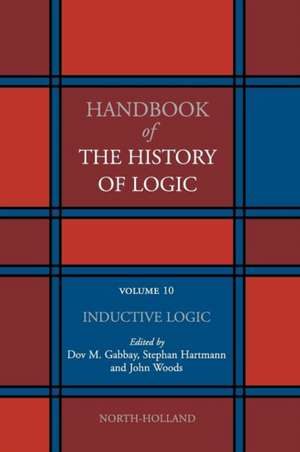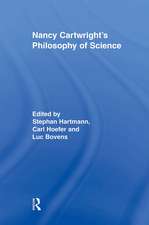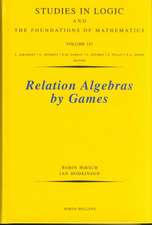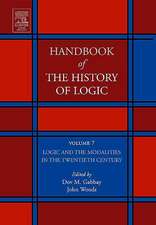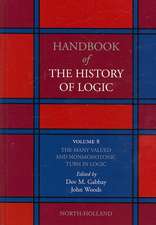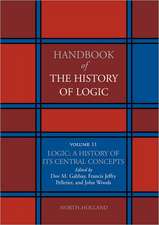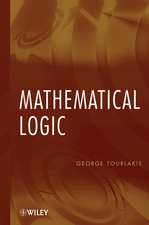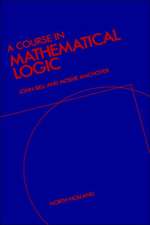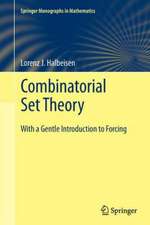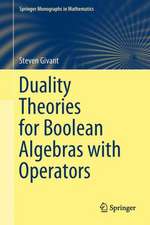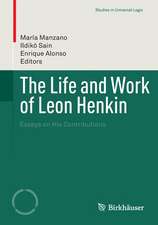Inductive Logic: Handbook of the History of Logic, cartea 10
Editat de Dov M. Gabbay, John Woods Stephan Hartmannen Limba Engleză Hardback – 4 mai 2011
- Chapter on the Port Royal contributions to probability theory and decision theory
- Serves as a singular contribution to the intellectual history of the 20th century
- Contains the latest scholarly discoveries and interpretative insights
Preț: 1514.38 lei
Preț vechi: 2074.50 lei
-27% Nou
Puncte Express: 2272
Preț estimativ în valută:
289.77€ • 303.36$ • 239.77£
289.77€ • 303.36$ • 239.77£
Carte tipărită la comandă
Livrare economică 05-19 aprilie
Preluare comenzi: 021 569.72.76
Specificații
ISBN-13: 9780444529367
ISBN-10: 0444529365
Pagini: 800
Dimensiuni: 182 x 257 x 38 mm
Greutate: 1.81 kg
Editura: ELSEVIER SCIENCE
Seria Handbook of the History of Logic
ISBN-10: 0444529365
Pagini: 800
Dimensiuni: 182 x 257 x 38 mm
Greutate: 1.81 kg
Editura: ELSEVIER SCIENCE
Seria Handbook of the History of Logic
Public țintă
Researchers and graduate students in all areas of logic: Historians of logic, cognitive psychologists, computer scientists, AI theorists, theorists of legal reasoningCuprins
Introduction (Dov Gabbay, Stephan Hartman and John Woods)
Induction before Hume (J. R. Milton)
Hume and the Problem of Induction (Marc Lange)
The Debate between Whewell and Mill on the Nature of Scientific Induction (Malcolm Forster)
An Explorer upon Untrodden Ground: Peirce on Abduction (Stathis Psillos)
The Modern Epistemic Interpretations of Probability: Logicism and Subjectivism (Maria Carla Galavotti)
Popper and Hypothetico-deductivism (Alan Musgrave)
Hempel and the Paradoxes of Confirmation (Jan Sprenger)
Carnap and the Logic of Induction (Sandy Zabell)
The Development of the Hintikka Program (Ilkka Niiniluoto)
Hans Reichenbach’s Probability Logic (Frederick Eberhardt and Clark Glymour)
Goodman and the Demise of Syntactic and Semantics Models (Robert Schwartz)
Development of Subjective Bayesianism (James Joyce)
Varieties of Bayesianism (Jonathan Weisberg)
Inductive Logic and Empirical Psychology (Nick Chater, Mike Oaksford, Ulrike Hahn and Evan Heit)
Inductive Logic and Statistics (Jan-Willem Romeijn)
Statistical Learning Theory (Ulrike von Luxburg and Bernhard Schoelkopf)
Formal Learning Theory in Context (Daniel Osherson and Scott Weinstein)
Mechanizing Induction (Ronald Ortner and Hannes Leitgeb)
Index
Induction before Hume (J. R. Milton)
Hume and the Problem of Induction (Marc Lange)
The Debate between Whewell and Mill on the Nature of Scientific Induction (Malcolm Forster)
An Explorer upon Untrodden Ground: Peirce on Abduction (Stathis Psillos)
The Modern Epistemic Interpretations of Probability: Logicism and Subjectivism (Maria Carla Galavotti)
Popper and Hypothetico-deductivism (Alan Musgrave)
Hempel and the Paradoxes of Confirmation (Jan Sprenger)
Carnap and the Logic of Induction (Sandy Zabell)
The Development of the Hintikka Program (Ilkka Niiniluoto)
Hans Reichenbach’s Probability Logic (Frederick Eberhardt and Clark Glymour)
Goodman and the Demise of Syntactic and Semantics Models (Robert Schwartz)
Development of Subjective Bayesianism (James Joyce)
Varieties of Bayesianism (Jonathan Weisberg)
Inductive Logic and Empirical Psychology (Nick Chater, Mike Oaksford, Ulrike Hahn and Evan Heit)
Inductive Logic and Statistics (Jan-Willem Romeijn)
Statistical Learning Theory (Ulrike von Luxburg and Bernhard Schoelkopf)
Formal Learning Theory in Context (Daniel Osherson and Scott Weinstein)
Mechanizing Induction (Ronald Ortner and Hannes Leitgeb)
Index
